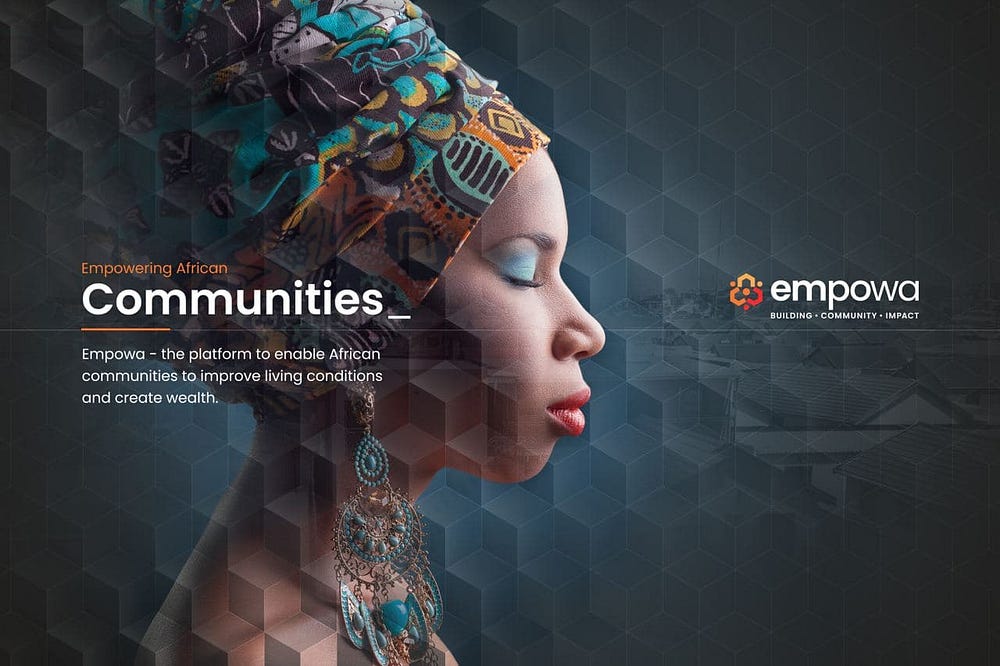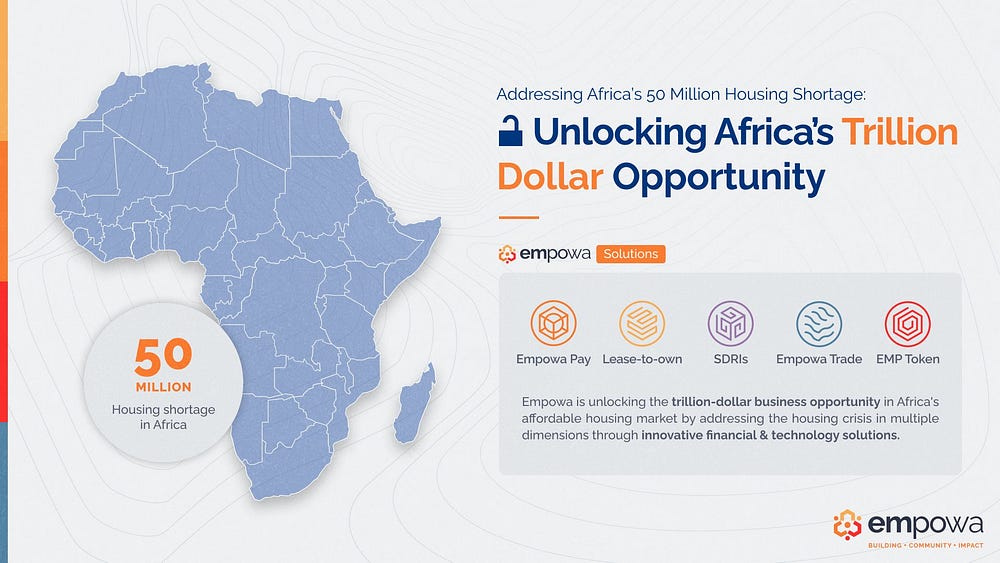The world is facing a growing housing crisis, with millions of people struggling to access affordable, safe, and secure homes. This crisis has far-reaching implications on social, economic, and environmental aspects of our lives.
The lack of affordable housing is particularly pronounced in developing countries, where rapid urbanization and population growth have outpaced the ability of governments and the private sector to meet the increasing demand for housing.
Empowa is a unique, decentralized property development and digital collectables platform that aims to address this global housing crisis by harnessing the power of community to empower people who are mostly excluded from the financial system.
These individuals experience exclusion due to various factors, including limited funding, gender, financial history, poverty, and other forms of discrimination. Empowa addresses these challenges by concentrating on essential areas like property-based economic empowerment, fostering a just economic system, providing affordable housing, encouraging community building, empowering women, and prioritizing environmental concerns.
The magnitude of this challenge is evident in the staggering statistics surrounding global wealth distribution and poverty. A staggering 97% of the world’s wealth is held by just 30% of the global population, leaving 70% of the planet economically disempowered.
Over the past 50 years, foreign aid amounting to more than $2.3 trillion has been dispersed to poor countries. However, research indicates that this aid can not only be ineffective but possibly damaging to recipient communities and countries.
This failure can be attributed to various factors, including corruption, overheads, audit costs, and money not reaching its intended recipients.
Investment in emerging economies, particularly Africa, has been fraught with challenges. Factors such as a lack of capital, the unknown, risk of corruption, depreciating currencies, legislative environments, and project risk due to a lack of skills and project management have limited the flow of investment into these regions.
This situation has created an investment backlog and pent-up demand for trillions of dollars of investment. In Africa, the only region in the world where urbanization has not led to poverty reduction, a mere 16% of urban households have permanent roofs over their heads.
This lack of adequate housing has severe consequences for urban health and safety, with infectious diseases becoming particularly difficult to contain in densely populated, informal settlements where residents may not have access to clean water, sanitation, adequate ventilation, and emergency healthcare.
The problems preventing the development of property in Africa are manifold, including issues related to property rights, affordability, building skills, and lack of delivery. It is estimated that more than 80% of the population has land and assets with no official or legal record of those assets, with property rights posing significant challenges for women in Africa.
The high cost of capital, fueled by low levels of investment, high-interest rates, and short finance terms, results in a lack of demand, leading to a shortage of building skills and low-quality products at exorbitant costs. Developer-built housing often targets the higher end of the market and rarely occurs at scale, leaving low to middle-income housing projects unaddressed.

So, what are the solutions?
To address the global housing crisis, particularly in the African market, we need to consider solutions that are sustainable, far-reaching, cost-effective, and environmentally friendly.
Empowa’s platform focuses on decentralizing funding and leveraging emerging technologies to create a holistic approach to tackle these challenges.
- Tokenization and Blockchain: Empowa’s platform utilizes tokenization to liberate investment in untapped asset classes by reducing transaction costs and risk while increasing liquidity. Blockchain technology underpins the platform’s decentralization, allowing for secure smart contracts and transaction verification. This approach enables social and financial investments into property assets, forming the basis for economic empowerment and environmental protection.
- Fintech: A cost-effective mechanism to manage fiat currency is essential for addressing the financial barriers faced by developing nations. Fintech solutions can facilitate access to finance for those who are typically excluded from the traditional banking system, promoting financial inclusion and growth.
- Modern Methods of Construction (MMC): Modular and standardized building techniques can revolutionize the property development sector by reducing costs, improving efficiency, and promoting the use of renewable materials. MMC enables a shift from fixed mortgages to asset-based funding, significantly reducing funding risks. Additionally, MMC’s modular construction allows for high-quality construction without requiring high-end construction skills.
- Property Rights: By employing modular and circular building methods, the platform can circumvent property land rights issues, delinking the building from the land. This approach can help address the property rights challenges faced by many in Africa, particularly women.
- Environmental Considerations: While achieving a CO2-negative, circular construction with renewable materials is currently impractical due to cost and supply constraints, Empowa seeks to support environmental objectives by promoting the use of renewable materials and reducing CO2 emissions.
- Digital Collectables and Non-Fungible Tokens (NFTs): The platform leverages the growing popularity of digital collectables and NFTs by incorporating community empowerment attributes into digital collectables representing properties and the people they support. This approach encourages purchasing and supports financially disadvantaged communities while unlocking wealth through new and innovative social interactions.
- Financial Return and Beyond: Empowa’s platform aims to create value beyond financial returns by addressing the United Nations’ Sustainable Development Goals (SDGs). The platform can alleviate poverty, improve economic and living conditions, promote financial inclusion, support the development of green buildings, provide alternative energy solutions, empower women economically, and enable local partnerships.
By combining decentralized funding methods with a startup methodology, Empowa can start small, move quickly, take risks, and grow the best property developers while building trusted suppliers and markets. The African housing market holds immense potential, and with the right price and approach, Empowa’s platform can drive growth in the market sector.

The Platform
The Empowra Platform offers a unique, decentralized marketplace where various participants can engage in partnerships for shared wealth creation through the growth in property demands in developing countries. The platform aims to empower communities by connecting collectors, landowners, suppliers, tenants, and other service providers in a comprehensive ecosystem.
Platform Participants
- Collectors: Individuals who purchase Empowerment Cards representing a unique portion of an African property development, catering to three distinct markets — traditional collectors, investors, and philanthropists.
- Land Owners: Owners of land in developing countries who can benefit from crowdfunding their property projects and utilizing decentralized finance to overcome traditional financing obstacles.
- Approved Suppliers: Construction companies that meet specific criteria, including timely delivery, eco-friendly materials, modular and circular building methods, community contributions, and ethical and quality standards.
- Tenants: Individuals seeking improved accommodation quality and inclusion in the wealth creation process through the Empowra platform.
- Platform Service Providers: Local project partners, property managers, yield generators, and fiat payment processors that facilitate various aspects of the property development and management process.
Platform Features
- Empowerment Cards: Non-Fungible Tokens (NFTs) representing a unique share of an empowerment project, with both financial and non-financial attributes. Collectors can trade, improve, and gamify these cards for greater impact.
- The Empowra Token (EMP): A utility token that streamlines currency exchanges within the platform, allowing for predictable tracking of value.
- Web Services: Frontend web applications and backend APIs for user interaction and integration with other applications.
- Smart Contracts: Utilizing the Cardano blockchain to lock or transfer EMP tokens according to specified criteria, as well as updating NFT attributes based on predefined rules.
- Off-Chain Agreements: Standardized agreements bridging real-world interactions with the Empowra platform, allowing for traceable and transparent records of actions carried out by participants and service providers.

An Example
Mary works with Betta Build, an Empowa Project Partner in South Africa, to build rental units on her land. Here’s a summary of the process:
- Betta Build assesses Mary’s land and suggests modular, relocatable units due to Mary’s lack of formal land title.
- They agree on building 4 units; an agreement is signed and recorded on the Empowa Platform.
- Betta Build engages a local supplier, who quotes R450,000 for construction.
- The rental property is valued at R750,000 and listed on the Empowa Platform for 50,000 EMP tokens.
- Empowerment Cards are generated, distributed among packs, and sold to fund the project.
- 30,000 EMP tokens are held in a smart contract for payment; the remaining 20,000 EMP tokens are transferred to Yield Generators.
- Betta Build helps Mary find a Property Manager, who collects rent, manages tenants, and maintains the property.
- Rental agreements are recorded on the Empowa Platform, and rent is collected in ZAR before being converted to EMP tokens.
- Rent is distributed among the Collector, Property Manager, and Mary according to a smart contract.
- Mary’s share of rent unlocks the 20,000 EMP tokens over the ownership transition period.
- An Insurance fund is maintained to cover potential relocation costs.
- After the initial ownership transition period, the Insurance fund becomes a tenant Rewards fund.
- Collectors can sell their Empowerment Cards on the Empowa Platform at any time.
- At the end of the ownership transition period, Mary takes full ownership, Collectors are paid in EMP tokens, and tenants receive rewards.
Why is this better?
This innovative approach offers several advantages over traditional methods:
- Financial Inclusion: Empowa’s model enables individuals like Mary, who may lack formal land titles or access to traditional financing, to build rental units and generate income.
- Risk Diversification: By distributing the project cost among multiple Collectors, the platform spreads the risk and makes it more attractive for investors to contribute.
- Modular and Relocatable Units: The use of relocatable units protects the investment in case of land disputes, ensuring the rental income continues elsewhere if needed.
- Transparent and Secure: The Empowa Platform, built on blockchain technology, ensures transparency, security, and traceability in all transactions and agreements.
- Empowerment of Local Communities: The platform encourages local development, job creation, and wealth generation by engaging local suppliers and property managers.
- Predictable Income: The Currency Stabiliser mechanism protects the project from currency fluctuations, ensuring predictable rental income in EMP tokens during the initial years.
- Incentives for Tenants: The tenant Rewards fund motivates tenants to pay rent consistently and maintain the property, fostering a sense of community and shared responsibility.
- Reputation Building: Tenants can build their reputation history on the platform, which can be beneficial for their future housing prospects or property ownership.
- Liquidity for Collectors: Collectors can sell their Empowerment Cards on the platform at any time, offering them flexibility and liquidity.
- Scalability: The platform’s model can be easily scaled and adapted to other locations and communities, promoting sustainable development and financial empowerment globally.
Empowa offers a practical and effective solution for community development and affordable housing. By using blockchain technology and collaborative financing, it creates a transparent and accessible system that benefits both property owners and investors.
Empowa’s approach not only addresses housing challenges but also promotes financial growth and stability for all parties involved, leading to stronger, more self-sufficient communities.










